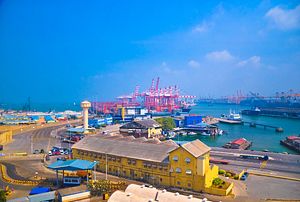“The sky is falling! The sky is falling!” represents the new conventional wisdom for some journalists appraising the current state of outward foreign direct investment (OFDI) from the People’s Republic of China (PRC). Rejected in Mexico due to domestic party politics, whipsawed in Sri Lanka by changes in government, obstructed by protests in Myanmar, scuppered by the U.S. Committee on Foreign Investment in the United States (CFIUS) national security and Australian Investment Board review processes, and hamstrung by the tenuous Afghani security situation, we are told that China Inc. has been “stung” by and is “struggling” with numerous investment and infrastructure deal cancellations, delays, modifications, obstacles, and rejections around the globe.
After a decade or so of stories about billion dollar deals by Chinese companies to buy resources, gain brands, technology, and know-how, and tap new markets, among other purposes, dominating the headlines, stories about Chinese OFDI (COFDI) “flops” – among them Tsinghua Unigroup’s fruitless pursuit of Micron Technology, GSR Ventures stalled bid for Philips Lumileds, and Citic Securities failed acquisition of Russell Investments – now have assumed equal or greater profile in the media. In fact, per some analyses, the total number of overseas projects running into trouble may top an astounding $250 billion and perhaps only “30 percent of China’s overseas investments are successful.”
For many, this only validates their image of Chinese investors and the Chinese government, which is tied closely in one way or another with many Chinese overseas investing firms, as hasty, ignorant, inexperienced, presumptuous that what works in China in terms of labor or firm-government relations can work abroad, and excessively risk acceptant. But much as the political and economic achievements of COFDI have been exaggerated over the years, the failures of COFDI and the Chinese entities engaged in OFDI, assuming commentators actually are talking about COFDI by Chinese firms, which is not always the case, are now being overstated.
First, it is odd to claim deals troubled by natural disasters, plunging commodity prices, or rejection by host government investment review processes such as CFIUS represent “soured” investments or confirm the existence of PRC or Chinese firm investment decision-making pathologies. For example, CFIUS decisions largely have to do with fears in the U.S. about China as a security threat.
Second, the gains from individual OFDI deals need to be understood holistically. Even if an individual acquisition or project collapses, a Chinese business still may generate overall gains from OFDI by, as an example, acquiring a brand, technology, or internationalization platform that it can leverage at home or in other countries or sectors.
Third, while there may be limited or no gains at the corporate or firm level from particular FDI transactions, it is entirely possible that the PRC qua country is gaining from more secure resource supplies, the upgrading of its firms, and the opening of new value added chains to Chinese businesses.
Fourth, as many have noted, OFDI by Chinese firms is a relatively new phenomenon and thus failures are normal. To be clear, this is not just a matter of the fact Chinese businesses will gain more experience in OFDI over time, but the fact, as some academic studies have noted, that the composition of Chinese companies investing overseas will change over time to younger, “smaller,” and more diverse firms that have genuine core competencies, are more efficient, and learn more rapidly than their state-owned enterprise counterparts, which dominated the first and second waves of COFDI. As well, Chinese firms will increase their investments in developed countries which indisputably have political risks, but, typically, not the same kind as the developing countries that Chinese investors have privileged in the past for a mix of political, economic, and historical reasons.
Finally, it should be pointed out that even firms from allegedly experienced developed countries frequently fail when investing overseas, whether as a result of ignorance, parochialism, or other factors seen to be defects particular to Chinese outward investors. All of the above is not to say the PRC or Chinese companies do not have problems dealing with political and other risks when investing or operating abroad. In many cases, they indeed could do a much better job in regard to communicating with host country stakeholders, learning about host country legal, political, and regulatory environments, and undertaking better corporate social responsibility practices. But the takeaway is that foreign businesses and governments should more carefully think about many of the issues noted above otherwise they will overlook some genuine competitive threats as well as opportunities for gains from COFDI.
Jean-Marc F. Blanchard is a Distinguished Professor with the School of Advanced International and Area Studies at East China Normal University (China) and Executive Director of the Mr. & Mrs. S.H. Wong Center for the Study of Multinational Corporations (USA).

































